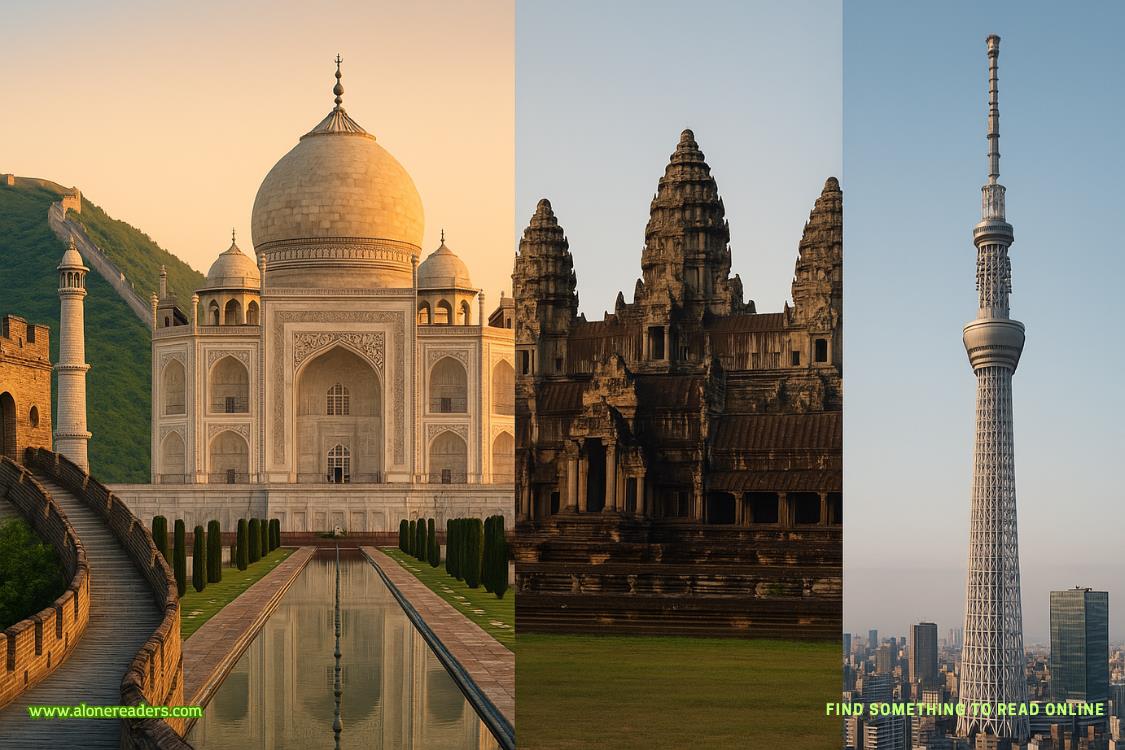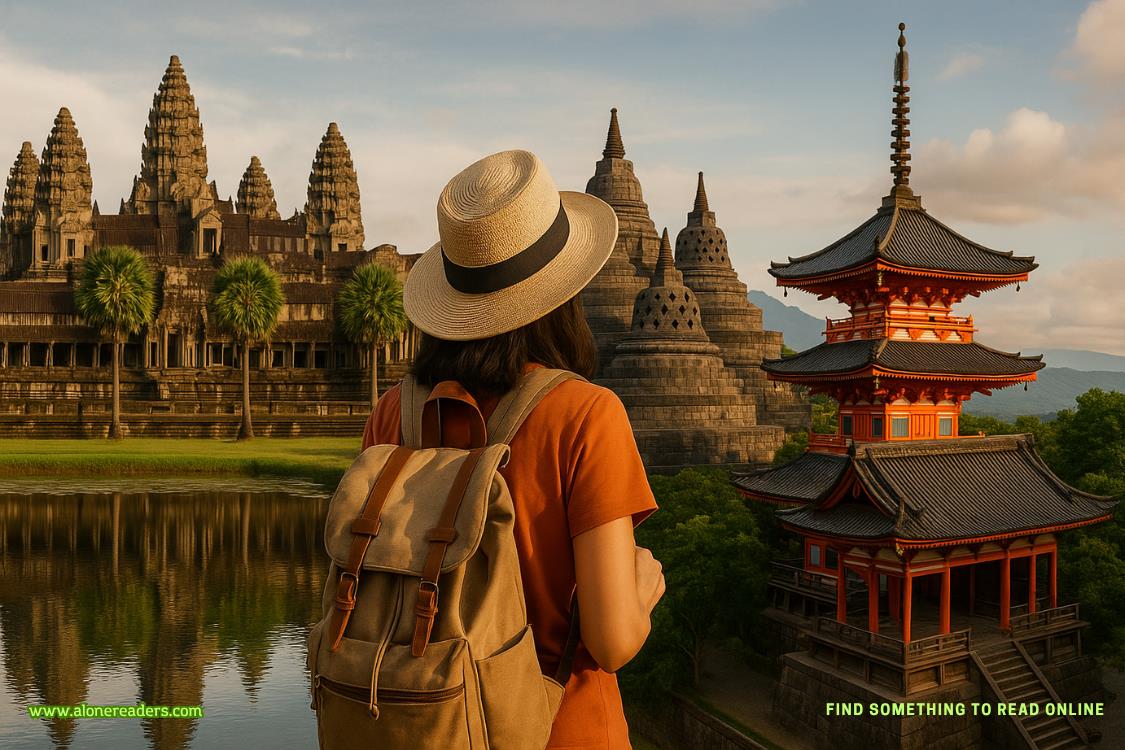Page 62 of Beyond the Shadowed Earth
Eda sagged against the cliffside. She’d wondered often during her long climb if Ileem had left any trace of himself at the monastery. Now she had her answer. He was caught like oil on her skin; she could not wash him off.
Torane turned back. “The princess said she had a vision of you, coming here. Climbing Tuer’s Mountain. Healing the cracks in the world.”
Eda gnawed the inside of her cheek so hard she tasted blood.
“But come.” Torane put gentle hands on her arms. “You’ve had a long journey. Food will help set you to rights, and then I will give you what assistance I can.”
Numbly, Eda started walking again. They drew nearer to the cliffs, and she saw that the buildings were arranged in levels, with narrow paths ascending and descending the mountain that connected them. The widest level—the very heart of Tal-Arohnd—was situated on a shelf of land jutting out from the cliff. It had space for rambling gardens and chicken pens, along with the great hall, which was the only structure not touching the mountain.
The temple was on this level as well, carved out of the cliffside. Eda looked quickly past it. Down a stretch of path beyond the temple lay a sprawling mountain village, which must be the one Morin had told her about. A scattering of people were walking up the path, some pulling goods on carts, some holding bundles of cloth and clay jars. One young man had a pair of goats trotting along behind him.
“They’re bringing supplies up from the village for the feast,” Torane explained, “and to welcome the caravan.”
“What feast?”
Torane glanced back at her. “The Feast of Tuer. Do you not observe it in Enduena?”
Unease squirmed through her. “The old Emperor abolished the feasts. I—the Empress was trying to reinstate them.”
Torane raised an eyebrow, not missing her slip. “And it didn’t work?”
“The gods did not will it,” she said bitterly.
And then they were passing through a wide empty field that stood before the great hall and on into the hall itself.
The interior was a single huge, rectangular room, vast carved pillars stretching up to the peaked wooden roof. On the long sides of the room, tall windows set with intricate stained glass let in the afternoon light, patches of stained violet, cerulean, and gold pooling on the floor. The whole place was a flurry of activity, more monks in the same rough-woven green robes and white headscarfs as Torane, carrying in heavy wooden tables or stocking the enormous fireplace at the back of the hall with logs. Others brought in garlands of flowers, which they strewed about the floor, while still others fit fat beeswax candles into intricately carved stone lamp stands. One monk didn’t leave his station at the back of the room, where he knelt in prayer before a square altar that was stained with blood and wine from centuries of offerings.
Almost before Eda could make sense of the whirling scene, the villagers began to flood in, bringing jugs of goat’s milk and wheels of cheese, colorful woven blankets, wine. A young monk in a green robe who was not wearing a white headscarf instructed the villagers where to lay their goods.
One of the villagers she recognized with a shock as Morin, who came in with the pair of goats. He looked very different than he had at the cartographer’s shop, bundled in a heavy woolen poncho dyed bright blue and red, his dark hair tousled from the wind. She didn’t understand how he could have possibly gotten here before her, but it was definitely him. She started toward him, but the young monk had apparently instructed him to take the goats somewhere outside, because he turned and left the hall again. Before she could follow, twelve Itan women swept in one after the other, the mist clinging to their long black hair like tiny glimmering diamonds.
“Priestesses from Ita,” said Torane. “They must have come with the caravan. Will you excuse me a moment?”
He stepped away and Eda found herself suddenly surrounded by the priestesses. They bowed to her. The youngest priestess—a girl who couldn’t have been more than fourteen—brushed her fingers across Eda’s forehead. “You are gods-touched,” she whispered in broken Enduenan.
Heat pulsed from Eda’s brow and she jerked away, skin crawling.
The girl looked at her intently. “Our goddess Ahdairon called my priestess-sisters and I here to meet you—the girl who will heal the world. It is an honor, my lady.”
“I’m not going to heal the world.”
But the priestesses didn’t seem to hear. They circled around her, tugging at her sleeves. “Come, come,” said the youngest one. “We’ll help you dress. We’ll make you ready for the festivities. For theqirta.”
Eda tried to shake them off but they held her tight in their midst, and would not let her go.
“Qirta, qirta,” they whispered all together.
“I’m not going to the feast. Get off of me. Getoff.”
And then Torane was at her elbow again, and the priestesses drew back, their white skirts dragging on the stone floor. They watched her with their dark eyes, silent and solemn.
“Come,” said Torane, “I’ll show you to a room for the night. You can rest before dinner and return here for the festivities, if you wish.”
Eda followed him back outside, gulping deep breaths of the sharp mountain air, her nerves shattered to pieces. They walked along a path that cut through the gardens and chicken yards, then climbed a rickety stair up the cliff to one of the little white buildings that clung there so impossibly.
“I hope you will attend the feast and honor us,” said Torane, then turned to leave her.
“What doesqirtamean?”















